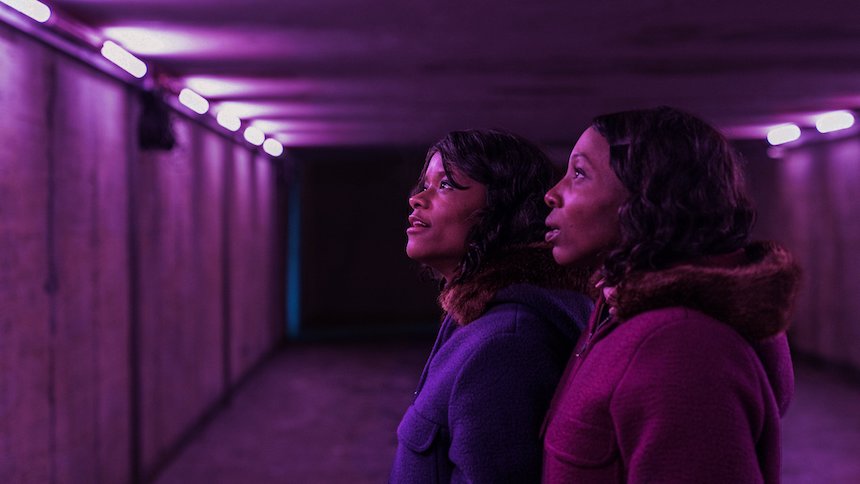Review: THE SILENT TWINS, A Tale of Two Sisters

A tale of two sisters and two halves, The Silent Twins, directed by celebrated Polish filmmaker Agnieszka Smoczynska (Fugue, The Lure, Viva Maria!) from Andrea Seigel’s (Handsome, Laggies) adaptation of Marjorie Wallace’s 1986 book of the same name, centers on two real-life identical twins, June and Jennifer Gibbons (played as young adults by Letitia Wright and Tamara Lawrance, respectively), their uniquely idiosyncratic, imagination-rich lives, and their life-and personality-altering experiences inside oppressive educational and psychiatric institutions that repeatedly attempted to “rehabilitate” them into fully conforming British citizens.
Both a cautionary tale and, in its limited way, a celebration of perseverance against a racist-tinged bureaucratic system that treated Afro-Caribbean immigrants, like the Gibbons family, as lesser than their melanin-challenged peers, The Silent Twins falters, sometimes badly, if not fatally, in a second half that, while supposedly hewing close to real-life events, turns the Gibbons sisters into passive, reactive figures impatiently waiting to be saved and their stories to be told to the outside world by a compassionate, empathetic journalist, Marjorie Wallace (Jodhi May), from interminable confinement in an institution that’s more prison than hospital over the course of more than a decade.
That issue, dramatizing an essentially non-dramatic turn of events that left the unconventional Gibbons sisters at the mercy of doctors, nurses, and other so-called caregivers who saw them both as problems to be fixed or resolved through isolation and copious amounts of prescription drugs, leaves the second half of The Silent Twins unmoored from the first half’s focus on the Gibbons twins, their turbulent interior lives, and their persistent, creative attempts to live freely, if not within the constraints of the physical world, then in the mental spaces they share as sisters and twins. As both, June and Jennifer have developed a specific language of their own they refused to share with outsiders including their parents and siblings.
Smoczynska and Seigel introduce that fascinatingly inward turn in the first moments, as the preteen Gibbons sisters (Leah Mondesir-Simmonds and Eva-Arianna Baxter), all but shut down in the presence of their immediate family, school mates, and teachers, adopting monastic-like silence as a coping mechanism for the bullying and racism (both barely touched upon here) they face as the only non-white, non-European family in a small British town. Their protective insularity deepens as they develop a shorthand for both their interactions and their imaginative play, spinning stories and creating arts and crafts to keep each other entertained.
With silence and non-involvement at school a likely norm, school authorities initially attempt to forcibly separate the sisters. When that (predictably) fails, they push them into a special education program that does little, if anything, to engage them on a personal or collective level. Instead, school authorities pass them through one year of elementary school after another, followed by a similar pattern in high school, and finally a full-time return to their parents’ home, where June and Jennifer, dreaming of sustaining themselves as writers of fiction, plays, and poetry, send out for a mail-order creative program and purchase a typewriter.
Before long, however, their natural urges for libidinal companionship threatens to destabilize an already fragile relationship. And like most teens or twenty-somethings, June and Jennifer begin to rebel, engaging in risky behavior, up to an including property damage that leads to their decade-long incarceration in Broadmoor Psychiatric Hospital.
From there, the film proceeds to a curiously muted, slightly underwhelming ending that, while presumably true to the facts surrounding the Gibbons twins and their fates, frustratingly leaves far too many questions unanswered, including anything resembling a psychiatric or even sociological explanation for their behavior or the role racism, both personal and institutional, played in the unfolding of their lives.
Elevated by uniformly strong performances, especially relative newcomer Tamara Lawrence as the more extroverted, expressive Jennifer Gibbons, and Smoczynska and Seigel’s admirable, if not entirely successful, decision to interweave June and Jennifer’s stories into the film via hand-wrought, intentionally crude animated recreations of the stop-motion kind, The Silent Twins is never less than worthwhile, a flawed, mostly engrossing exploration of two intertwined lives and to the British institutions that ultimately failed them both.
The Silent Twins opens in U.S. movie theaters on Friday, September 16, via Focus Features. Visit the official site for more information.
The Silent Twins
Director(s)
- Agnieszka Smoczynska
Writer(s)
- Andrea Seigel
- Marjorie Wallace
Cast
- Letitia Wright
- Jodhi May
- Michael Smiley







